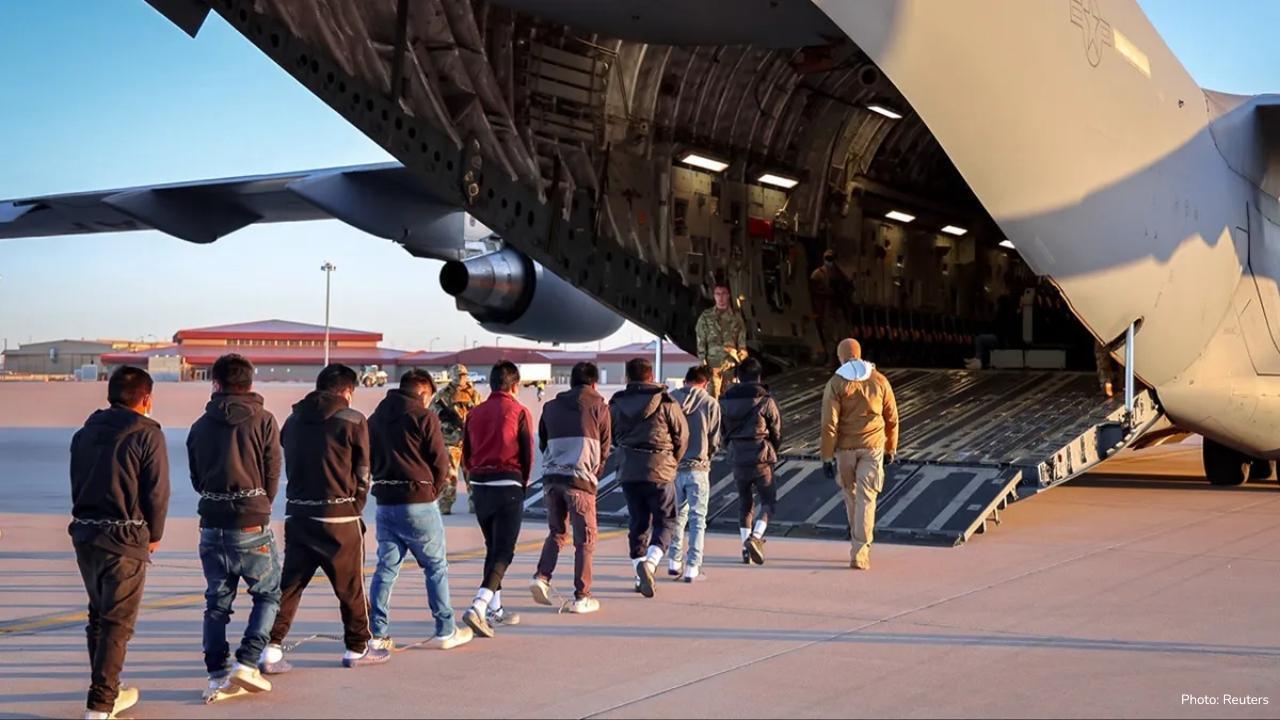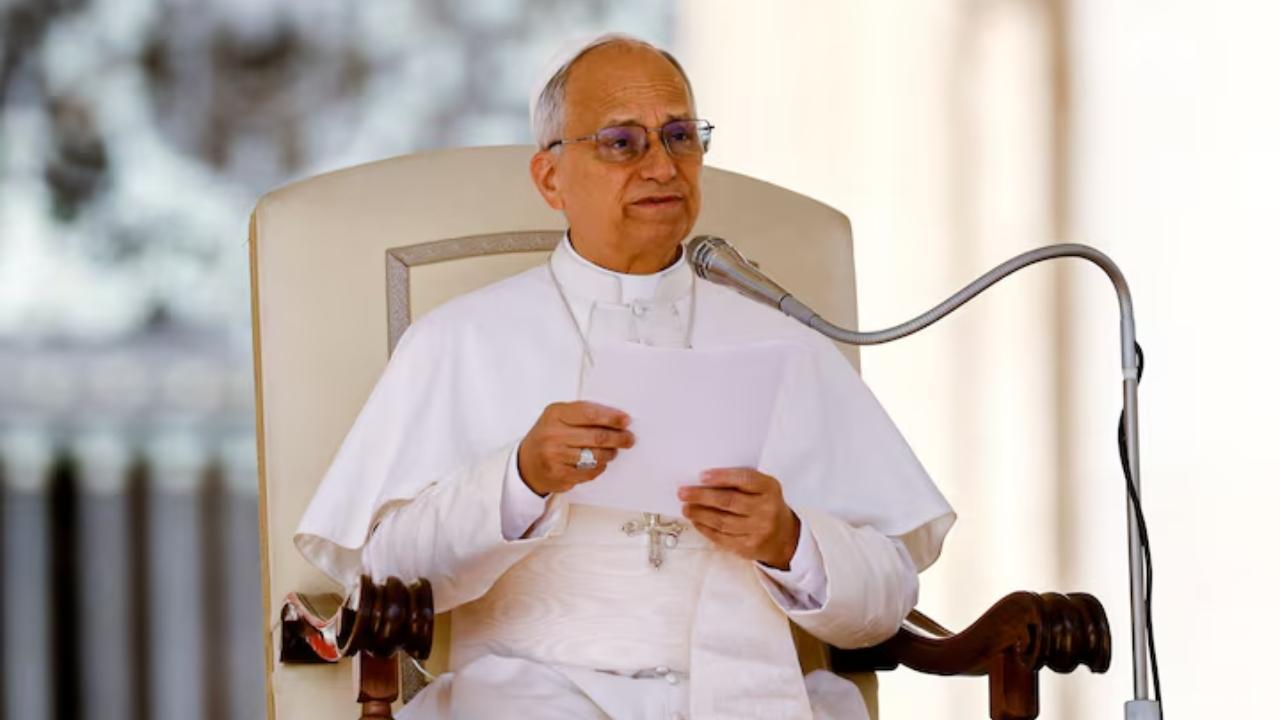
Post by : Monika
On September 30, 2025, the United States deported about 100 Iranian citizens back to Iran following a rare diplomatic agreement between the two countries. The deportation took place via a U.S.-chartered flight from Louisiana, with a scheduled stop in Qatar before arriving in Iran. The action drew attention worldwide because it marks an unusual moment of cooperation between the U.S. and Iran, two nations that have had strained relations for decades.
Background of the Deportation
The deportees included a mix of people who had entered the U.S. illegally and others who had been convicted of various crimes. While the U.S. authorities did not provide detailed reasons for each individual’s deportation, reports indicate that many had been detained in immigration facilities for long periods. Some agreed voluntarily to return to Iran, while others were deported involuntarily under U.S. immigration enforcement rules.
Iran’s government coordinated the return of its citizens and emphasized that their safety would be ensured upon arrival. Iranian officials clarified that this deportation was primarily a consular matter and not a political or diplomatic concession between Tehran and Washington. They also called on U.S. authorities to treat the deportees humanely and respect their rights throughout the process.
U.S. Immigration Policy and Enforcement
This deportation reflects the broader immigration policies of the U.S. under President Donald Trump. His administration has focused on enforcing immigration laws more strictly, aiming to reduce illegal border crossings and deport individuals who do not have legal status in the country.
Deportation operations have sometimes faced logistical challenges, particularly for nationals of countries like Iran, where diplomatic relations with the U.S. are limited. Finding safe and legal ways to return citizens to their home countries often requires negotiations and agreements with foreign governments. This deal with Iran allowed the U.S. to carry out the deportation safely and efficiently while minimizing risks to both the deportees and officials involved.
Earlier this year, a similar international cooperation effort saw 119 individuals, including Iranians, deported to Panama under special arrangements. These actions show that the U.S. administration has been exploring multiple channels to manage immigration effectively through cooperation with other nations.
Reactions to the Deportation
Reactions to the deportation have been mixed. Supporters argue that it is a practical solution to enforce immigration laws and manage population control. They see it as a necessary action to ensure that people who entered the country illegally face consequences while maintaining order within U.S. borders.
Critics, however, have expressed concern about the treatment of the deportees and the potential risks they might face upon returning to Iran. Human rights organizations have called for careful monitoring to ensure that deported individuals are not subjected to persecution or mistreatment.
Some experts note that while the deportation is a rare example of U.S.-Iran cooperation, it does not indicate a significant improvement in the overall relationship between the two countries. Tensions remain high due to Iran’s nuclear program, regional activities, and past incidents of U.S. sanctions and diplomatic conflicts. This deportation is largely a consular and administrative action rather than a diplomatic breakthrough.
Logistics of the Deportation
The deportation process involved several steps to ensure safety and compliance with international law. Individuals were transported from immigration detention centers in Louisiana to a chartered flight, which then made a scheduled stop in Qatar. From there, they continued to Iran under the supervision of Iranian authorities.
U.S. officials stated that all necessary procedures were followed, including medical checks and documentation, to ensure the deportees’ health and legal compliance. Coordination with Iranian officials was essential to ensure that no complications arose during transit, as the flight involved crossing multiple international airspaces.
Diplomatic and Humanitarian Considerations
Deportations involving countries with strained relations require careful planning. In this case, both the U.S. and Iranian governments worked together to avoid diplomatic incidents. While the U.S. has not maintained strong formal ties with Iran since 1980, temporary arrangements like this allow for specific cooperation on issues such as repatriation of citizens.
From a humanitarian perspective, the deportation raised questions about the well-being of the individuals involved. Some of the deportees may have left Iran due to economic hardship or political pressures, and returning to the country could pose challenges. Both governments emphasized that measures were in place to ensure the deportees’ safety and basic needs upon arrival.
International observers noted that these types of deportations are rare and often require detailed planning and negotiations. This particular deportation is likely to be used as an example of how even countries with tense relations can find limited areas of cooperation when there is mutual interest, such as managing migration and ensuring the safe return of citizens.
Historical Context
Relations between the U.S. and Iran have been complicated for decades. Since the 1979 Islamic Revolution and the U.S. embassy hostage crisis, the two nations have had minimal diplomatic contact. Issues such as Iran’s nuclear program, regional military actions, and economic sanctions have continued to fuel tensions.
In this context, deporting Iranian citizens represents a limited form of cooperation focused on administrative and humanitarian matters rather than political or strategic issues. While it does not signify a broader reconciliation, it demonstrates that operational agreements can still be reached when both sides see a practical benefit.
Implications for U.S.-Iran Relations
Challenges for the Deportees
Returning to Iran presents personal and social challenges for the deported individuals. They may face difficulties reintegrating into Iranian society, especially if they have been away for many years. Some may have limited access to employment or face social scrutiny. These human aspects are often highlighted by advocacy groups, which call for both countries to monitor the situation closely to prevent hardships.
Broader Context of Deportation Policies
Globally, deportations are common as countries seek to manage migration flows. However, deporting citizens to countries with limited diplomatic ties, or where human rights concerns exist, is more complicated. This U.S.-Iran deportation required careful negotiation to ensure that international laws and human rights standards were followed.
In addition, such actions can impact international perceptions of a country’s immigration policies. The U.S. has faced criticism in the past for deporting individuals to countries with political instability or human rights concerns. By coordinating with Iran, U.S. authorities sought to reduce potential criticism while enforcing legal obligations.
The deportation of 100 Iranians back to Tehran represents a rare instance of cooperation between the United States and Iran. While the operation is primarily administrative and humanitarian in nature, it demonstrates that even nations with tense relationships can find common ground on practical issues.
Although it does not signify a major diplomatic breakthrough, the operation may serve as a precedent for future cases where practical agreements can be reached between the U.S. and countries with whom it has limited formal relations.
Overall, the deportation emphasizes the balance between law enforcement, diplomacy, and humanitarian considerations. Both the U.S. and Iran coordinated to ensure the safety and legal processing of the deportees. International observers, human rights groups, and governments will continue to monitor the situation to ensure that similar operations respect human dignity and follow international protocols.
The situation also serves as a reminder of the challenges faced by migrants who leave their home countries in search of safety, economic opportunity, or better living conditions. Their journey often involves navigating complex legal systems, diplomatic negotiations, and personal hardships. This deportation, while orderly and coordinated, underscores the human dimension of immigration policies and international relations.
In the coming months, the deported individuals will likely face a process of reintegration into Iranian society. Governments, advocacy groups, and local communities may play roles in ensuring that they receive support and opportunities for a stable life. For the United States, this case demonstrates the importance of strategic planning and international negotiation in handling immigration enforcement while minimizing risks and maintaining humanitarian standards.
U.S. deportation Iran Iranian citizens










Global Markets React to China's Economic Slowdown and Policy Changes
Global markets face uncertainty as China's economic slowdown and policy changes impact investor conf

Gaza Aid Flotilla Faces Unidentified Vessels, Enhances Security
Global Sumud Flotilla reports unlit boats approaching, prompting increased safety measures as they d

U.S. Reduces Military Role in Iraq, Shifts Focus to Syria
The U.S. is scaling back its military presence in Iraq, transferring security responsibilities to th

US Deports 100 Iranians in Deal with Tehran
The US has deported 100 Iranians back to Iran after a deal with Tehran. This marks a rare cooperatio

Pope Leo Hopes Hamas Will Accept Trump's Gaza Peace Plan
Pope Leo expresses hope that Hamas will accept Trump's 20-point Gaza peace plan, urging respect for

Italy Ends Navy Support for Gaza Aid Flotilla Amid Tensions
Italy withdraws naval escort for Gaza-bound aid flotilla, citing risks of Israeli interception. Acti